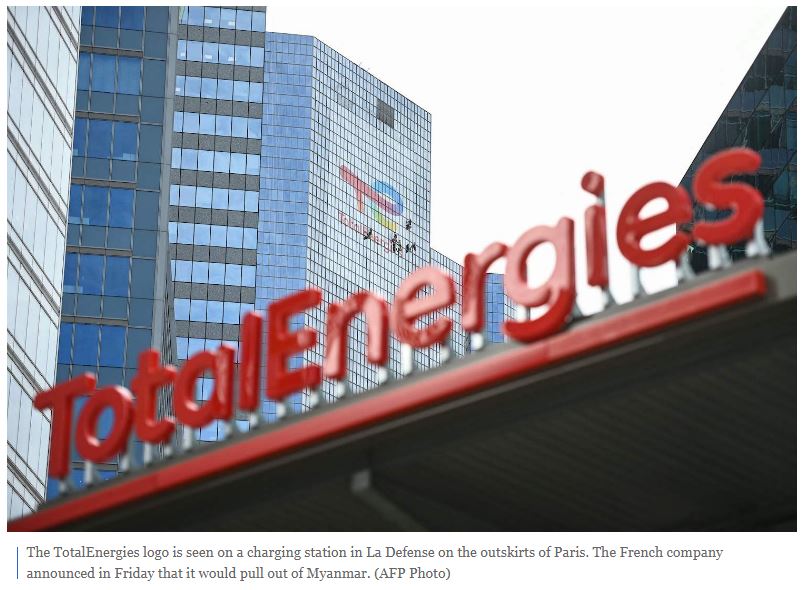Impact of oil firms’ exit from Myanmar limited
The exit of the energy giants TotalEnergies and Chevron from Myanmar’s billion-dollar gas industry has been hailed by rights groups, but analysts say it will not significantly weaken the generals and may even enrich the military in the short term.
Both firms had faced pressure to cut financial links with the junta that toppled Aung San Suu Kyi’s government last year and has since killed more than 1,400 people in a crackdown on dissent, according to a monitoring group.
The French company and the US oil major Chevron on Friday announced plans to withdraw from the Yadana gas field in the Andaman Sea, a major source of natural gas for electricity generation for Thailand as well as Myanmar.
Total is the main shareholder and operator of the Yadana project with a share of 31.24%, while Chevron holds 28%. PTT Exploration and Production of Thailand (PTTEP) holds 25.5% and state-owned Myanma Oil and Gas Enterprise (MOGE) the remaining 15%.
Revenue from MOGE is one of the largest sources of income for the military in Myanmar.
PTTEP said in a statement it was reviewing the implications of the decision by the two Western companies, adding that the energy security of Myanmar and Thailand remained its chief concern.
Myanmar’s gas industry — which Human Rights Watch says generates $1 billion a year — has so far evaded tough sanctions imposed by the United States and EU on lucrative military-owned timber and jade enterprises.
Friday’s “announcement is certainly significant”, Manny Maung, Myanmar researcher at Human Rights Watch told AFP.
“But there is a lot more pressure needed to defeat this junta for good.
“Governments no longer have an excuse to delay imposing targeted sanctions on oil and gas entities … to prevent any other unscrupulous entities from entering the market.”
The departure of Total and Chevron will deprive the junta of hundreds of millions of dollars a year in foreign revenue as the economy it presides over tanks from months of unrest and a mass walkout.
TotalEnergies alone paid around $176 million to Myanmar authorities in 2020 in the form of taxes and “production rights”, according to the company’s own financial statements.
Naw Susanna Hla Hla Soe, a minister in the shadow government dominated by lawmakers from Aung San Suu Kyi’s party which is working to topple the military said the news sent a “very strong message” to the junta.
“Other companies must follow Total’s example to put even more pressure on the generals,” she added.
‘No confidence’
If the French and American companies were willing — belatedly — to bow to rights groups and activists’ pressure, there are others with fewer qualms about making money in junta-run Myanmar.
“It will be harder to force the hand of Asian investors because their human rights commitments and the stakeholder pressures on them are lower,” Dr Htwe Htwe Thein at Curtin University in Australia, told AFP.
Others say it is possible the junta will profit short-term from any change in ownership.
The withdrawal of TotalEnergies is “a big vote of no confidence in the regime”, said Richard Horsey, senior adviser for Myanmar to International Crisis Group.
But the junta would likely be able to “sell the departing operators’ stakes”, he added — which would inject much-needed hard currency into the state coffers.
The military would also be able to “attract and negotiate favourable terms and signature payments from operators in jurisdictions beyond the scope of Western sanctions”.
TotalEnergies will not exit immediately — it said in a statement it would continue to operate the site for the next six months at the latest until its contractual period ends.
About 30% of the gas produced at Yadana is sold to MOGE for domestic use, with the rest exported by PTT to Thailand via a pipeline.
Total and MOGE hold stakes in Moattama Gas Transportation Company (MGTC), which owns the pipeline linking the Yadana field and Thailand.
MGTC, which was created in 1994 and incorporated in Bermuda, has set exorbitant prices for the transport of gas, the French newspaper Le Monde reported last year, citing company accounts and audits.
The scheme reduced the amount of royalties received by the Myanmar government since transporting gas is taxed at a lower rate, the newspaper said.
This allowed the military to directly receive money from gas transport via MOGE, with turnover of $523 million in 2019 against just $11 million in charges, it reported.
Total and Chevron last year suspended cash distributions by the pipeline operating venture following reports that the payouts were enriching the military.
Total had said earlier that its interests in Myanmar would be shared between the remaining partners, unless they objected. Ultimately, Myanma Oil & Gas could end up with a larger share, a spokesman for the French company conceded.
“As things stand … means a likely cash windfall for the regime unless ways are found to prevent that, which must be priority,” Horsey said on Twitter.
And the generals’ economic portfolio stretches far beyond gas, and includes interests in mines, banks, agriculture and tourism, providing the military with a colossal — and closely guarded — fortune.
The jade industry alone — dominated by military-owned business — provides the military with billions of dollars a year in off-the-books revenue, analysts say.
There also remains the question of how easy TotalEnergies and Chevron will find it to exit junta-ruled Myanmar, said Htwe Htwe Thein, citing Norway’s Telenor, which announced it was withdrawing in July, but whose exit has been held up by the military.
“Total may suffer the same fate,” she said.
Source: https://www.bangkokpost.com/business/2251751/impact-of-oil-firms-exit-from-myanmar-limited


 English
English




